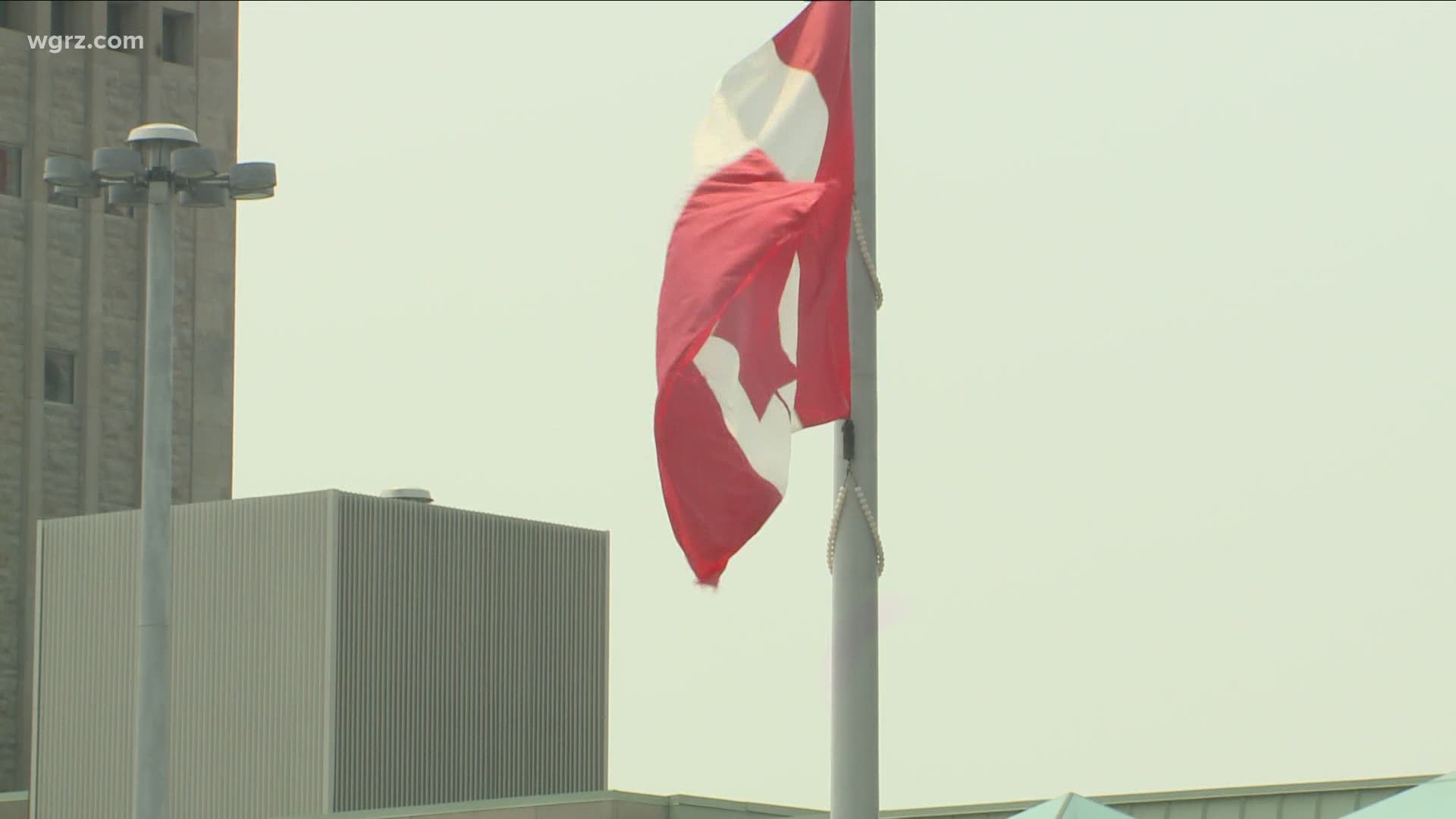BUFFALO, N.Y. — Once the Canadian border opens to non-essential travelers from the U.S. on August 9, there are several rules those intending to travel must remember and adhere to, particularly with land crossings
For those eager to make the trip they haven't been able to make in 16 months, the first step is to get a COVID-19 shot.
If you are an adult you need to be fully vaccinated to cross the border, it has to have been done at least two weeks prior to crossing, and you have to have proof of it.
You also have to arrange to have a COVID test within 72 hours prior to crossing with a negative result, which you also must have proof of.
While NY Governor Andrew Cuomo ordered an end to free testing previously offered through the state health department more than a month ago, free testing for COVID-19 is still being offered at sites located throughout Erie County. Anyone who wishes to schedule an appointment can call (716) 858-2929 to speak to an Erie County Department of Health employee to learn how to secure a spot for an in-person test. Additional information can be found here.
Get the ArriveCAN App
Prior to travel, you must also register your information and travel plans through ArriveCAN which can be downloaded as an app on your phone.
The app/website will have users upload a variety of documents, including a photo of their vaccination card and COVID-19 test results.
When you arrive at the border, Canadian border agents will ask to see an ArriveCAN receipt, which can be in the form of your phone screen or a print out if you complete the information through the official web portal.
On the later note, be wary of sites asking for payment information which according to Canadian officials are fraudulent, as there is no fee to sign up through ArriveCAN.
You also need to have a quarantine plan, subject to review by Canadian authorities which if they find unsatisfactory, you could be denied admittance.
Once across, there is a chance you could randomly be selected to take another COVID test, or be handed a home testing kit, which you're expected to take and submit the day you arrive.
Anyone who submits false information on vaccination status could be liable for a $750,000 fine, a 6 months prison sentence, or both according to Canadian officials.
Check List for Travel to Canada
Follow this link for a check list for travel to Canada
Crossing with Kids
Children under 12 still can't be vaccinated in the U.S., however they can enter Canada accompanied by fully vaccinated adults.
Their information also must be inputted into ArriveCAN, and are not only subject to having a Covid-19 test with a negative result within 72 hours prior to coming to Canada, but also must be tested on the day of their arrival once they cross the border.
According to Canadian Health officials, "This means they can move around with their parents, but must avoid group settings - such as camps or daycares - during the first 14 days after their arrival."
If your stay is for more than a week, children will be subject to testing again, on day 8 of your stay.
Crossing Questions
Here are answers to other questions we've received from viewers. Answers were supplied by Health Canada and the Public Health Agency of Canada.
-If a traveler is selected for a random Covid Test upon crossing, is there a charge for that? (how much and is the price in U.S. or Canadian funds?)
The pre-entry test is at the cost to the traveler and varies based on country/location they are travelling from.
-It is noted that non vaccinated travelers (specifically children under 12 not yet eligible for vaccination) must take a test upon day one of arrival and on day 8 if they are still in Canada. Is there a charge for either one of those tests (how much and if in US or Canadian $$)
At this time, the Government of Canada will provide the tests at no cost to the traveler. The Government of Canada reserves the right to change this direction at a future time.
-It is noted that proof of a negative Covid test result within 72 hours prior to crossing is required for all travelers. Are the results of "home tests" acceptable?
These tests are considered acceptable molecular tests:
- PCR - Polymerase chain reaction
- RT-PCR – reverse transcription real time PCR
- Quantitative PCR (qPCR)
- Nucleic acid test (NAT) or Nucleic acid amplification test (NAATs)
- Reverse transcription loop-mediated isothermal amplification (RT-LAMP)
- Isothermal amplification
- Droplet digital PCR or digital droplet PCR (ddPCR)
- Transcription-mediated amplification (TMA)
- RNA (Ribonucleic acid)
- Ct (cycle threshold)
- CRISPR
- Sequencing
- Next generational sequencing (NGS) or whole genome sequencing (WGS)
- Oxford Nanopore sequencing (LamPORE)
- Detection of the N gene
- Detection of Orf1a/b
- Detection of the S gene
- Detection of the E gene
- Detection of the RdRp gene
These tests use methods such as a nasopharyngeal (NP) swab, nose swab, or saliva sample. At this time, proof of having a vaccine will not replace a negative test result.
The Government of Canada will notify travelers should it become mandatory to obtain COVID-19 molecular tests from specific accredited laboratories or facilities.

